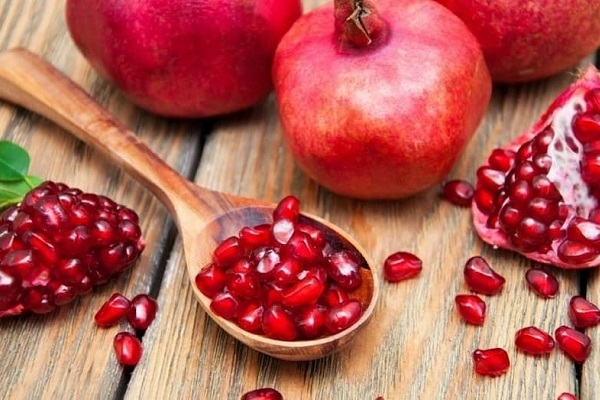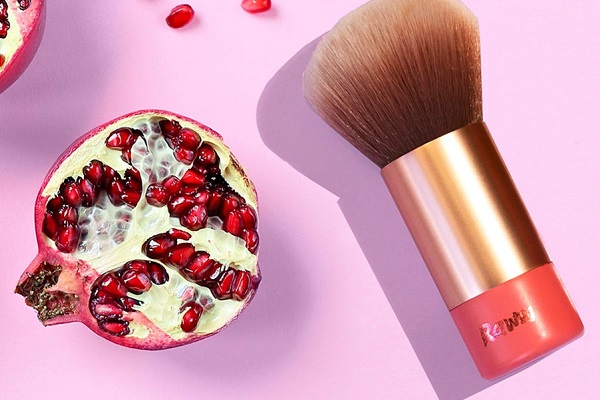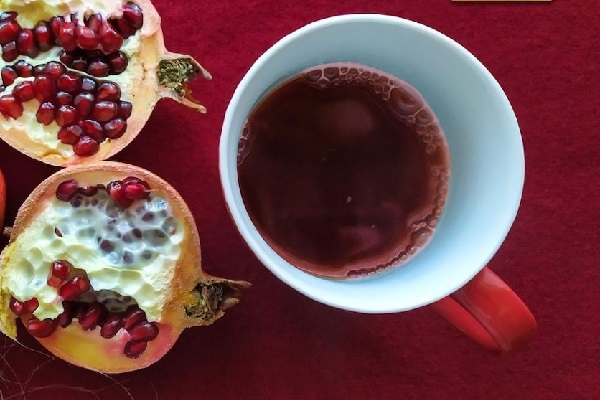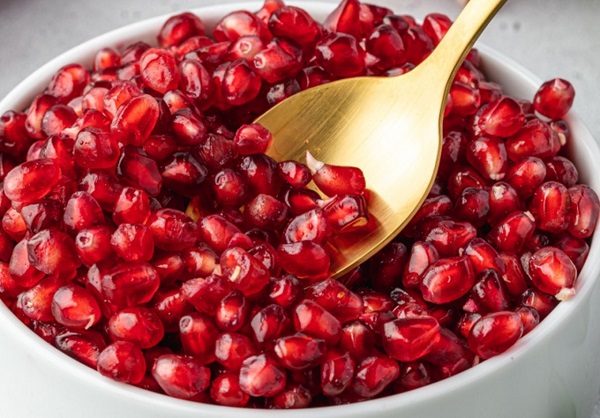Pomegranate has been used for a long period for its nutritional benefits and vibrant flavour. Also, it has recently emerged as a standout ingredient in the skincare industry to get the extra added benefits for its skin. However, with its rich antioxidant properties, anti-inflammatory properties, and ability to promote hydration and collagen production, pomegranate is proving to be a versatile and effective ingredient for various skin concerns.
However there are several Benefits of Pomegranate for the Skin, if you want to know in depth then this article is for you
Benefits of Pomegranate for Skin
1. Antioxidant Power
Pomegranate is a powerhouse of antioxidants, like polyphenols, and vitamin C. These antioxidants play a crucial role in combating oxidative stress, which is caused by free radicals. Free radicals are unstable molecules that can damage cells, which leads to premature aging and various skin issues. By neutralizing these free radicals, antioxidants help protect the skin from environmental damage and reduce signs of aging such as fine lines, wrinkles, and sagging.
2. Anti-Inflammatory Properties
The anti-inflammatory properties of pomegranate are beneficial for calming irritated skin and reducing redness. Inflammation can be triggered by various factors, including environmental stressors, acne, and sensitivity. Pomegranate contains compounds like ellagic acid and tannins that help reduce inflammation and soothe the skin, making it an excellent choice for individuals with sensitive or inflamed skin conditions.

3. Hydration
Pomegranate seeds are rich in punicic acid, a type of fatty acid that helps to lock in moisture and maintain skin hydration. Proper hydration is essential for keeping the skin supple, plump, and healthy. When the skin is well-hydrated, it appears more radiant and resilient. Pomegranates support skin hydration which makes it an ideal ingredient for preventing dryness and promoting a healthy, dewy complexion.
4. Anti-Aging Benefits
The antioxidants and vitamins present in pomegranate can help stimulate collagen production, which is essential for maintaining skin elasticity and firmness. Collagen is a protein that provides structural support to the skin, and its production naturally declines with age. By enhancing collagen synthesis, pomegranate helps to reduce the appearance of fine lines and wrinkles, leading to a smoother and more youthful-looking complexion.
5. Brightening Effects
Did you know that, Pomegranate can also help even out skin tone and brighten the complexion. The fruit contains natural exfoliating enzymes and vitamin C, which work together to reduce hyperpigmentation and dark spots. By promoting cell turnover and inhibiting melanin production, pomegranate helps to create a more even and radiant skin tone.
Pomegranate into Your Skincare Routine
1. Pomegranate Seed Oil
Pomegranate seed oil is extracted from the seeds of the pomegranate fruit and is rich in essential fatty acids, antioxidants, and vitamins. However, it offers numerous benefits for the skin, making it a valuable addition to your skincare routine.
- Usage: To use pomegranate seed oil, apply a few drops directly to your skin or mix it with your favourite moisturizer. You can also use it as a facial oil in your nighttime routine to provide intense hydration and nourishment.
- Benefits: Pomegranate seed oil helps to improve skin elasticity, reduce the appearance of fine lines and wrinkles, and enhance overall hydration. Its rich antioxidant content also protects against environmental damage and supports skin repair.
2. Pomegranate Extract
Pomegranate extract is a concentrated form of pomegranate’s beneficial compounds and is commonly used in various skincare products, including serums, creams, and masks.
- Usage: Look for serums or creams it contains pomegranate extract as an active ingredient. Apply these products directly to your skin as part of your daily skincare routine. For best results, use them consistently and follow the product’s application instructions.
- Benefits: Pomegranate extract helps fight free radicals, reduce inflammation, and brighten the complexion. It can also improve skin texture and promote a more even skin tone.
3. Pomegranate Juice
Drinking pomegranate juice offers internal benefits that can also positively affect your skin. However, the juice is rich in antioxidants and vitamins that support overall skin health and vitality.
- Usage: Adptiong pomegranate juice into your daily diet by drinking a glass each day. Opt for 100% pure pomegranate juice with no added sugars or artificial ingredients for the best results.
- Benefits: Consuming pomegranate juice can help improve skin elasticity, combat signs of aging, and support a healthy, glowing complexion from within. The antioxidants and vitamins in the juice contribute to overall skin health and may help prevent premature aging.
4. DIY Pomegranate Face Masks
Creating DIY face masks with pomegranate can be a fun and effective way to enjoy the fruit’s benefits directly on your skin. You can use fresh pomegranate juice or crushed pomegranate seeds to make your own masks at home.
- Ingredients: Combine pomegranate juice or crushed pomegranate seeds with other natural ingredients such as yogurt, honey, or oatmeal. For example, mix 1 tablespoon of pomegranate juice with 1 tablespoon of yogurt and 1 teaspoon of honey to create a hydrating and brightening mask.
- Usage: Apply the mask to your face and leave it on for 10-15 minutes. Rinse off with lukewarm water and follow with your regular skincare routine.
- Benefits: DIY pomegranate masks can help exfoliate, brighten, and hydrate the skin. They also provide a natural way to enjoy the fruit’s antioxidants and other beneficial compounds.

Source: RAWW Cosmetics
5. Pomegranate-Infused Skincare Products
In addition to using pomegranate oil, extract, or juice directly, you can also benefit from various pomegranate-infused skincare products. These products are specially designed to deliver the fruit’s benefits in a convenient and effective form.
- Usage: Choose products like cleansers, toners, exfoliants, and moisturizers that feature pomegranate as a key ingredient. Apply these products into your daily skincare routine as directed.
- Benefits: Pomegranate-infused products leverage the fruit’s antioxidant and anti-inflammatory properties to cleanse, tone, and refine the skin. However, they can also enhance hydration, brighten the complexion, and support overall skin health.
Additional Tips for Using Pomegranate in Skincare
Patch Test
A patch Test is the most important before applying any new products to your skin, however before trying new pomegranate-based products or DIY treatments, it’s essential to perform a patch test to ensure you don’t have an adverse reaction. Apply a small amount of the product or mixture to a small area of your skin, such as the inner wrist or behind the ear, and wait 24 hours to check for any signs of irritation or sensitivity. If you don’t see any kind of reaction then you can apply all over your face and body.
Consistency
For the best results, adopt pomegranate-based products or treatments into your skincare routine consistently. While some benefits may be visible quickly, others, such as improved skin elasticity and reduced signs of aging, may take time to develop. Regular use will help you achieve and maintain the best results.
Sun Protection
While pomegranate can help improve skin health, it’s essential to use sunscreen to protect your skin from UV damage. Sun exposure can accelerate skin aging and lead to issues such as dark spots and hyperpigmentation. Apply a broad-spectrum sunscreen with SPF 30 or higher daily, even on cloudy days, to protect your skin and enhance the benefits of your pomegranate-based skincare routine.
Hydration and Diet
In addition to using pomegranate in your skincare routine, maintaining proper hydration and a balanced diet is crucial for overall skin health. Drink plenty of water throughout the day and consume a variety of fruits, vegetables, and healthy fats to support skin hydration and nourishment.
Alternative Treatments
If you find that pomegranate-based products or treatments don’t provide the desired results however consider exploring alternative skincare options. Your skincare needs may vary based on your skin type, concerns, and goals. Consult with a dermatologist or skincare professional to determine the best approach for achieving your desired results.

Who Should Not Use?
1. Individuals with Allergies
Allergic Reactions: Some people may have allergic reactions to pomegranate or its derivatives. Symptoms can include redness, itching, swelling, or rash. If you have a known allergy to pomegranate or similar fruits, it’s best to avoid products containing pomegranate.
Patch Testing: Before using any pomegranate-based skincare product, perform a patch test. Apply a small amount to a discreet area of the skin (such as the inner forearm) and wait 24 hours to see if any allergic reaction occurs.
2. People with Sensitive Skin
Potential Irritation: Although pomegranate has anti-inflammatory properties, some individuals with extremely sensitive skin may experience irritation or discomfort. Pomegranate’s natural acids and enzymes, while generally mild, can sometimes exacerbate sensitivity.
Consultation and Testing: If you have sensitive skin, consult with a dermatologist before adopting pomegranate into your routine. Choose products specifically formulated for sensitive skin and always conduct a patch test.
3. Individuals with Certain Skin Conditions
Acne-Prone Skin: Pomegranate is not typically known to exacerbate acne, but some individuals with acne-prone skin might find that certain formulations can clog pores or cause breakouts. This is particularly true for heavier oils or thick creams.
Dermatitis and Eczema: If you have conditions like dermatitis or eczema, pomegranate-based products might aggravate these issues due to their active ingredients. Always seek advice from a healthcare professional before trying new skincare products.
4. People with Sun Sensitivity
Photosensitivity: Although pomegranate is generally not known to increase sun sensitivity, any new product, especially those with active ingredients, can sometimes make skin more sensitive to sunlight.
Sun Protection: Regardless of the skincare ingredients you use, always apply broad-spectrum sunscreen daily to protect your skin from UV damage, especially when trying new products.
5. Those with Known Skin Reactions to Exfoliants
Exfoliation Sensitivity: Pomegranate contains natural exfoliating enzymes that can help with cell turnover. However, if you have skin that reacts poorly to exfoliants, even natural ones, you should be cautious.
Moderation: If you choose to use pomegranate-based exfoliants or masks, use them in moderation and monitor your skin’s response. Over-exfoliation can lead to irritation and compromise the skin’s barrier.
6. Pregnant or Nursing Women
Precautionary Measures: While pomegranate is generally considered safe, pregnant or nursing women should consult with their healthcare provider before using new skincare products, especially those with concentrated extracts or essential oils.
Ingredient Safety: Some skincare products might contain additional ingredients that are not recommended during pregnancy or breastfeeding. Always check the full ingredient list and seek professional advice.
7. People Using Certain Medications
Interactions: If you are using topical medications or undergoing treatments that could interact with skincare ingredients, including pomegranate, consult with your healthcare provider. Some active ingredients in pomegranate may affect the absorption or efficacy of certain treatments.
Professional Advice: Consult your dermatologist or healthcare provider to ensure that pomegranate-based products are compatible with your current skincare regimen or medical treatments.
Combination of pomegranate with other skincare ingredients?
Pomegranate generally pairs well with other skincare ingredients, such as:
- Hyaluronic Acid: For added hydration.
- Vitamin E: For enhanced antioxidant protection.
- Niacinamide: For brightening and soothing effects.
However, avoid combining it with potentially irritating ingredients like strong acids or retinoids unless recommended by a dermatologist.

Conclusion
Pomegranate has emerged as a buzzy and highly effective ingredient in skincare, thanks to its impressive range of benefits. From its potent antioxidant and anti-inflammatory properties to its ability to promote hydration and collagen production, pomegranate offers a wealth of advantages for improving skin health and appearance. By incorporating pomegranate seed oil, extract, juice, or DIY masks into your skincare routine, you can harness the fruit’s natural goodness to achieve a healthier, more radiant complexion.
Remember to use pomegranate-based products consistently, perform patch tests, and protect your skin with sunscreen for the best results. With its versatility and efficacy, pomegranate is a valuable addition to any skincare regimen, helping you to achieve and maintain beautiful, glowing skin.
FAQs
Also, read more about 13 Benefits Of Mulberry For Skin: Mulberry For Skin Is Your Best Bet For Glowing Skin
